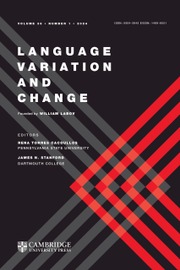Article contents
Discourse markers in the spoken Portuguese of Rio de Janeiro
Published online by Cambridge University Press: 28 November 2008
Abstract
We analyze four major classes of discourse marker used in Brazilian Portuguese: né and other requests for feedback; aí, a sequential connector; ah, bom, and other turn initiators; and assim, a marker of explanation. The distribution of these forms is compared in argumentation, description, narration, and other genres and explained in terms of discourse function. Sociodemographic conditioning is also analyzed. An innovative component of the data analysis is an accounting for rates of occurrence per number of clauses in the speech samples studied. The results were elaborated through a series of other studies confirming the discourse function of the various markers. A comparison of the results with previous work on English and French discourse markers reveals striking parallels and raises questions about the grammaticalization of these forms.
Information
- Type
- Research Article
- Information
- Copyright
- Copyright © Cambridge University Press 1992
References
- 16
- Cited by

